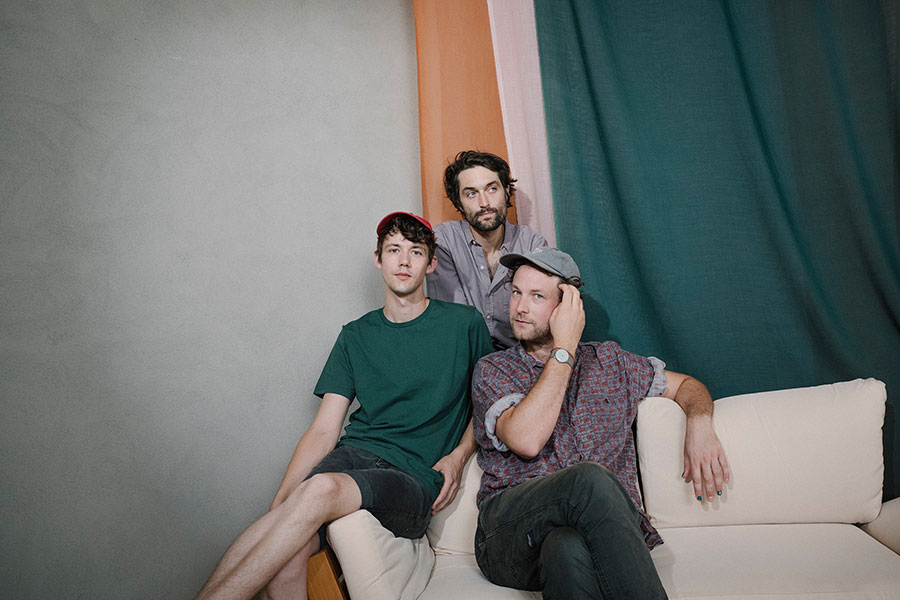It is a special thing for a musician or a band when its music is instantly recognizable. For the band AnnenMayKantereit, singer Henning May’s deep and rich voice is just that: instantly recognizable. Upon first glance, it is surprising to hear such a tone emerge from such a young man.
When May’s voice is combined with the light, memorable melodies on piano or guitar, it is easy to see why the band has found great success in the German-speaking world. (And they are not afraid to do some English language music, too. But we language learners will stick to the German tunes, right? Right!)
So this month, set those toes tapping and learn German with the music of AnnenMayKantereit!
Get to Know AnnenMayKantereit
AnnenMayKantereit was formed in 2011 by Christopher Annen, Henning May, and Severin Kantereit. At the time, the three were still attending school in Cologne. The guys combined their last names in order to create the name of the band.
To hone their skills the group busked as street musicians in their hometown. Bass player Lars Lötgering joined during this time but was replaced three years later by Malte Huck.
In 2013, the band took a progressive and modern approach to getting noticed. They self-released a self-titled live album. The album included some recordings from their street performances. They also began releasing their music themselves on YouTube. Following the release of a video for their track “Wohin du gehst,” things started to heat up for the group.
They completed a nationwide tour, hit the summer festival circuit, and then served as openers for the popular band Beatsteaks.
While the focus of this article is to highlight German language music, it is worth pointing out that the group has recorded a number of English language tracks. Included among the tracks is a cover of Susanne Vega’s “Tom’s Diner” with Giant Rooks, which captures the funkiness.
The Music of AnnenMayKantereit
In 2015, the group released their Wird schon irgendwie gehen EP. This time their record wasn’t self-released by Vertigo Berlin. The hype around AnnenMayKantereit began to grow quickly. They continued to tour and May guested on Berlin rappers K.I.Z‘s “Hurra die Welt geht unter.”
But it was the group’s first single, “Oft gefragt,” that music listeners noticed. In March 2016, the group finally released their debut album, Alles nix Konkretes, a rock album that is never over the top but is never afraid to create beautiful pop-friendly melodies. The album went to the top of the German and Austrian music charts and, in the process, it went gold three times in Germany. The album is full of instantly memorable and recognizable tracks, including not only “Oft gefragt” but also “Barfuß am Klavier,” “Pocahontas,” and the pounding rhythm of “21, 22, 23.”
On Schlagschatten, their sophomore album, AnnenMayKantereit picks up where the debut left off. Unafraid of exploring different melodies and styles, they make it their own. And while pop music sometimes lacks a depth of meaning or intention, it is a criticism that can not be leveled against AnnenMayKantereit. The band starts things off with “Marie,” a song of loss and grieving that borrows from poet Rainer Maria Rilke’s work “The Panther.” And while May’s vocals are a thoughtful and reflective near growl on tracks like “Ich geh heut nicht mehr tanzen,” his bandmates’ instrumentation is crisp and fluid.
In 2020, the band returned with 12, their third album. And the band continues to take chances and stretch their ability without making their fans feel excluded. The less than a minute “So wies war” is like a robotic monastic chant. Tracks like “Gegenwart,” with its dreamy instrumentation and vocals that sound as though they’re in slow motion, show the band retaining their gentle pop sound while still bending it and stretching it to try new things.
While AnnenMayKantereit were never quite acoustic, their sound was never heavily electronic nor was it very large. They always made a big impact with their delivery and the strength of their melodies and vocals. On their 2023 album Es ist Abend und wir sitzen bei mir, it feels like the group has just turned the notch up on their instrumentation. It feels more rhythmic (“Ausgehen” and “Lass es kreisen”) and more engaging (“Du tust mir nie mehr weh”) and, yet, at times more poppy (“Katharina”).
Looking for more German language music recommendations? Well look no further!
Photo by Martin Lamberty. This post contains affiliate links.

Pingback: German Music: K.I.Z. - Reverberations